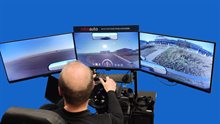How Next-Gen Mobile Networks are Enabling Automotive Teleoperation Use Cases
In March 2025, TNO, Roboauto, and V-Tron achieved a milestone in the TrialsNet Open Call by successfully concluding field trials at the Do IoT Fieldlab, located at Unmanned Valley. These tests highlight how next generation mobile networks will enable new applications in the automotive industry.
The trials demonstrated how TNO's ‘beyond 5G network’ can provide on-demand bandwidth guarantees through a teleoperation use case. Using easy-to-use network API, such as CAMARA Quality-on-Demand (QoD), the team demonstrated how vertical applications could dynamically request Quality-of-Service (QoS) guarantees from the mobile network. This is the first time network quality on demand has been applied to a teleoperation case which imposes such challenging bandwidth requirements on the network.
Teleoperation of a Truck via 5G/6G Networks
During the trial, the team successfully teleoperated a truck using the network infrastructure hosted at Unmanned Valley. This network infrastructure is owned and operated by TU Delft’s Do IoT Fieldlab as part of the Future Networks and Services Program which is funded by the National Growth Fund.

Two Phases of Trials
- November Trials: Initial tests were conducted to verify the system's functionality after integration among TNO, Roboauto, and V-Tron.
- February and March Trials: These trials included longer experiments with different setups. The teleoperation remote station was deployed via both edge and central cloud server infrastructures, allowing the partners to test the performance and reliability of the network.
A Leap Forward for 6G and Automotive Applications
The successful teleoperation of a truck using on-demand network QoS highlights 6G's potential for critical applications such as teleoperated driving. We have shown that easy-to-use network APIs enable service providers to seamlessly interact with the network, subscribe to network performance metrics, and request changes to network quality only when needed. The trials demonstrated that tele-operation could be consistently maintained for extended durations, even with significant background traffic from other network users. It also highlights the potential of a close collaboration between companies and knowledge institutes in the Netherlands to innovate in 6G networks.




